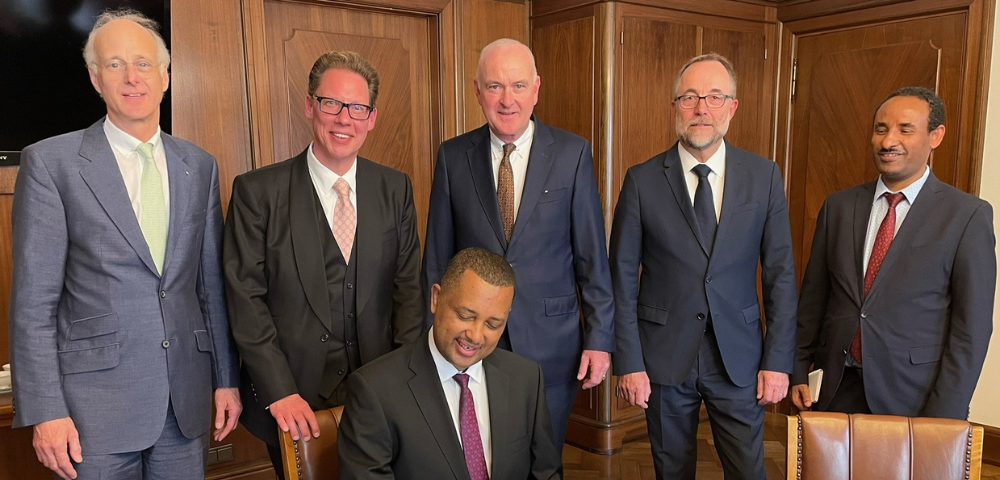In mid-May, the Ethiopian Ambassador H.E. Fekadu Beyene Ayana visited Bremen. The Vice President of the Bremen Cotton Exchange, Fritz Grobien, also took part in a meeting with representatives of Bremen‘s business community at the Bremen Chamber of Commerce. Also present were the Vice President of the Chamber of Commerce André Grobien, Ferdinand Möhring from the BLG Logistics Group and Hayilay Tessema, Deputy Head of Mission at the Ethiopian Embassy. The event was organized and accompanied by the Honorary Consul of Ethiopia in Bremen, Thomas Gerkmann.
The Multi-Ethnic State Has Important Natural Resources
In recent decades, the multi-ethnic state of Ethiopia (120 million inhabitants) has transformed itself into a country with emerging service and industrial sectors that can do more than just coffee and agriculture. The ambassador emphasized that Ethiopia has important natural resources such as gold, platinum, copper and natural gas to offer, but that recurring droughts and floods in various parts of the country also present economic and political challenges, as well as poor infrastructure, a high inflation rate, cumbersome bureaucracy, a shortage of foreign currency and rising world market prices for fuel and food.
German Supply Chain Act Was Topic
Other topics of discussion included the long-standing diplomatic and economic relations between Germany and Ethiopia, the Ethiopian education and vocational training sector and the organizationally challenging effects of the German Supply Chain Act (LKSG) and the European Deforestation Directive on Ethiopian producers who have to deal with the regulations.
Drawing the EU Commission‘s Attention to Weaknesses
Vice President Fritz Grobien suggested approaching the EU Commission with a joint letter from the Ethiopian Embassy, the BLG, the Chamber of Commerce and the Bremen Cotton Exchange to draw attention to the weaknesses in the supply chain. The weakest links in the chain, the suppliers in the raw material countries, run the risk of having to meet the requirements of the LKSG if these are passed on in the supply chain. They will not be able to comply.
Picture: in the foreground: H.E. Fekadu Beyene Ayana, in the back, from right to left: Fritz Grobien, Thomas Gerkmann, André Grobien, Ferdinand Möhring, Hayilay Tessema, courtesy of the Chamber of Commerce Bremen

